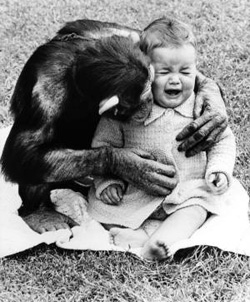Lacrimosa

The story goes like this … At a meeting of the Greenville chapter of La Leche League International, many of the women present, for reasons of expediency, wore no foundation garments. This brought their nipples into direct contact with their outer garments and, when a baby somewhere in the room began to cry, it was observed that dark stains appeared on many of the women’s blouses.
They were expressing milk involuntarily.
Maybe it’s apocryphal, but I’ve kept this story filed away as evidence that young mothers’ brains must produce a chemical that suppresses what I’d judge to be the very reasonable urge to kill their children. God knows, I’ve wanted to kill their children often enough after only passing acquaintance with them. To actually live with all that crying and linen fouling and carrying on must be hellish.
Reminded last night of the La Leche League incident, I determined to do a little research this morning and sure enough, in his book, Keys to Calming the Fussy Baby, pediatrician William Sears writes, “What is even more fascinating about your infant’s cry is the effect it has on the parents, especially the mother. Studies have shown (that a mother is) designed to give a nurturant response to (her) baby’s cry, (in reaction to which) the blood flow to (her) breast doubles, the mothering hormones increase and she has a biological urge to respond.”
Thank you, Dr. Sears, for confirming some of my most cherished theories about parenthood. Now what’s a “mothering hormone?”